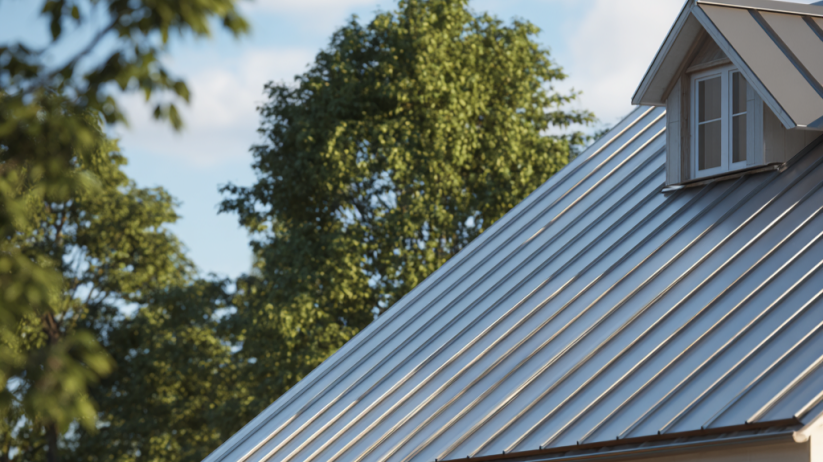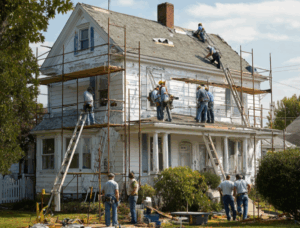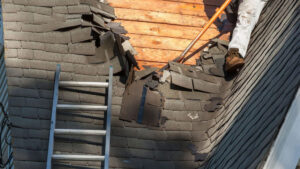When Seasons Flip-Flop, Your Roof Pays the Price
If you’ve lived in Delaware for more than a few seasons, you know how unpredictable our weather can be. One day it’s sunny and 85, the next it’s sleeting sideways. These swings take a toll—not just on your patience, but on your roof.
We get a lot of questions from homeowners trying to choose between metal and asphalt roofs—especially with all the buzz around Delaware metal roofing and talk about roofing maintenance for extreme temperatures. Folks want to know what really holds up when the forecast can’t make up its mind.
So, in this blog, we’re laying it out plainly. You’ll see how both roof types perform in Delaware’s wild climate, where one has an edge over the other, and what role things like high temperature underlayment for metal roofs play in long-term performance.
Here’s what we’ll cover:
- How metal vs. asphalt shingles deal with heat, cold, and wild swings
- The importance of good underlayment (especially on metal)
- What kind of maintenance each type needs in extreme conditions
- Real talk on cost, durability, and what makes sense for your home
- How we build better roofs at Grand Exteriors, right here in Delaware
If you’re weighing your roofing options and not sure where to start, Grand Exteriors can help. We’re local, experienced, and straight shooters.
Why This Decision Matters in Delaware
This isn’t Texas heat or Minnesota cold. Delaware’s weather is a bit of both—and that’s exactly what makes choosing the right roof more complicated than it seems.
We get freeze-thaw cycles in winter, hot and humid summers, and some nasty coastal storms in between. That means your roofing material needs to do a lot more than just look good from the curb.
Some Quick Definitions
- Thermal Expansion & Contraction – All materials expand when they get hot and contract when they cool. That movement can break seals, wear out fasteners, or tear shingles.
- Reflectivity vs. Absorption – Some materials reflect heat, others soak it in. That impacts attic temps, energy bills, and even roof lifespan.
- Underlayment – This is the layer under your shingles or panels. For metal, a high temperature underlayment is a must-have—not optional.
- Ice Dams – These form when melting snow refreezes at the roof’s edge, pushing water under shingles or panels. Happens a lot around here.
What Delaware Weather Does to Roofs
We get:
- High temps in summer that cook your attic
- Cold snaps in winter that test your materials
- Quick swings that push roofs through freeze-thaw cycles
- Rain, sleet, snow, wind—and sometimes all in the same week
So, whatever roof you go with, it needs to be built for extremes, not just average days.
What You Should Know Before Picking Metal or Asphalt
Roofing isn’t one-size-fits-all. Before you make a call, make sure you’ve thought through:
1. Cost Over Time
Metal roofs cost more up front but tend to last longer. Asphalt shingles are cheaper now but may need more maintenance or an earlier replacement. Think long game.
2. Permits and Warranties
Delaware doesn’t have wild permit hoops, but your installer should still follow code and install materials to manufacturer specs—especially with metal. Skipping the right underlayment can void warranties. (We don’t cut those corners.)
3. Material Quality
Not all shingles or panels are equal. Metal needs high-temp-rated underlayment, corrosion-resistant coatings, and expansion-friendly fasteners. Asphalt needs tough granules and synthetic underlayments to stand up to heat and cold.
4. Roof Geometry
Got dormers, valleys, or low slope? That might affect what roofing system fits best. Metal performs differently on low-slope roofs than asphalt does.
5. Ongoing Maintenance
Both types need checkups. Flashings, seals, fasteners, and debris removal matter no matter which roof you have.
Metal vs. Asphalt: A Straightforward Comparison
Let’s break down how these two roofing systems hold up where it counts.
Delaware’s Big Weather Tests: Who Performs Better?
Hot Summers and Roof Heat
- Metal: Reflects more sunlight. That means lower attic temps and longer underlayment life. It’s a win—especially with proper venting.
- Asphalt: Absorbs heat. That shortens the life of shingles and bakes your attic, unless you’ve got stellar insulation.
Cold Snaps and Freeze-Thaw Stress
- Metal: Expands and contracts a lot, so you need floating clips and proper installation. Done right, it holds up great. Done wrong, it leaks.
- Asphalt: Doesn’t move as much, but it can crack, curl, or separate at seams over time—especially if it’s already aged.
Snow, Ice, and Ice Dams
- Metal: Snow slides off more easily. Less buildup, less weight, and fewer ice dams. Just make sure your edges are flashed properly.
- Asphalt: Tends to hold snow longer. More likely to get ice dams unless you’ve got ice/water shields and great drainage.
Maintenance and Longevity
- Metal: 40–60+ years with the right setup. Needs inspections but less repair overall.
- Asphalt: 20–30 years max, more like 15–20 in our climate. Needs more patching and shingle replacement over time.
How Grand Exteriors Builds Roofs for Temperature Swings
We’ve been doing this long enough to know what works here—and what doesn’t. Our goal is to help you get a roof that performs through every season, not just the easy ones.
Here’s how we handle it:
- For metal roofs, we always install a high temperature underlayment that can take the heat without peeling, cracking, or compromising.
- We make sure your attic’s insulated and ventilated so the roof can breathe.
- We use fasteners and flashings that move with the metal—not against it.
- For asphalt, we use top-rated shingles and synthetic underlayment that’s made to last in a place like Delaware.
- We offer maintenance plans so your roof stays healthy long after install day.
Pros and Cons in Plain English
Material | Pros | Cons |
Metal | Long life, great in heat and snow, low maintenance | Higher initial cost, needs skilled installation |
Asphalt | Lower upfront cost, quieter in rain | Shorter lifespan, more upkeep, heat absorption |
Delaware Roofing Materials FAQs: What Homeowners Want to Know About Metal vs. Asphalt
Still comparing roofing materials? You’re not alone. These are some of the most common questions we hear from homeowners across Delaware when deciding between metal and asphalt—especially when temperature extremes are part of the conversation.
Is Delaware metal roofing a smart investment?
Yes, Delaware metal roofing is a smart investment for homeowners looking for long-term durability, better energy efficiency, and superior resistance to heat and snow. Its ability to handle wide temperature swings makes it ideal for our region’s unpredictable weather patterns.
How does roofing maintenance for extreme temperatures work?
Roofing maintenance for extreme temperatures means inspecting your roof seasonally to catch stress-related issues like seal failure, fastener loosening (for metal), or granule loss and cracking (for asphalt). These checks help extend the lifespan of both types of roofing.
Why is high temperature underlayment for metal roof installation so important?
High temperature underlayment for metal roof installations is important because it protects your home from heat-related damage beneath the panels. Without it, extreme summer temperatures can cause standard underlayments to degrade, leading to leaks and shortened roof life.
Can I install metal roofing over my old shingles?
Yes, you can install metal roofing over old asphalt shingles in some cases, but it’s not always the best solution. At Grand Exteriors, we usually recommend removing the old layer to ensure the decking is sound and to allow for proper underlayment installation.
Does metal make your home hotter or cooler?
Metal roofing helps make your home cooler by reflecting more sunlight than asphalt shingles. When paired with proper attic insulation and ventilation, it can reduce heat buildup and lower cooling costs during Delaware’s hot summers.
Build for the Weather You Actually Have
The truth is, both metal and asphalt can work in Delaware. But they need to be done right, with materials built to handle the kind of temperature swings we live with.
If you’re leaning toward Delaware metal roofing, don’t skip the details like high temperature underlayment or proper venting. If you’re sticking with shingles, choose products and installation practices that can handle hot sun, heavy snow, and quick changes.
At Grand Exteriors, we don’t cut corners. We build roofs that last—and we stand behind our work.
Schedule your free inspection today. Let’s figure out what’s best for your home and your budget, and build a roof that handles whatever Delaware throws at it.






